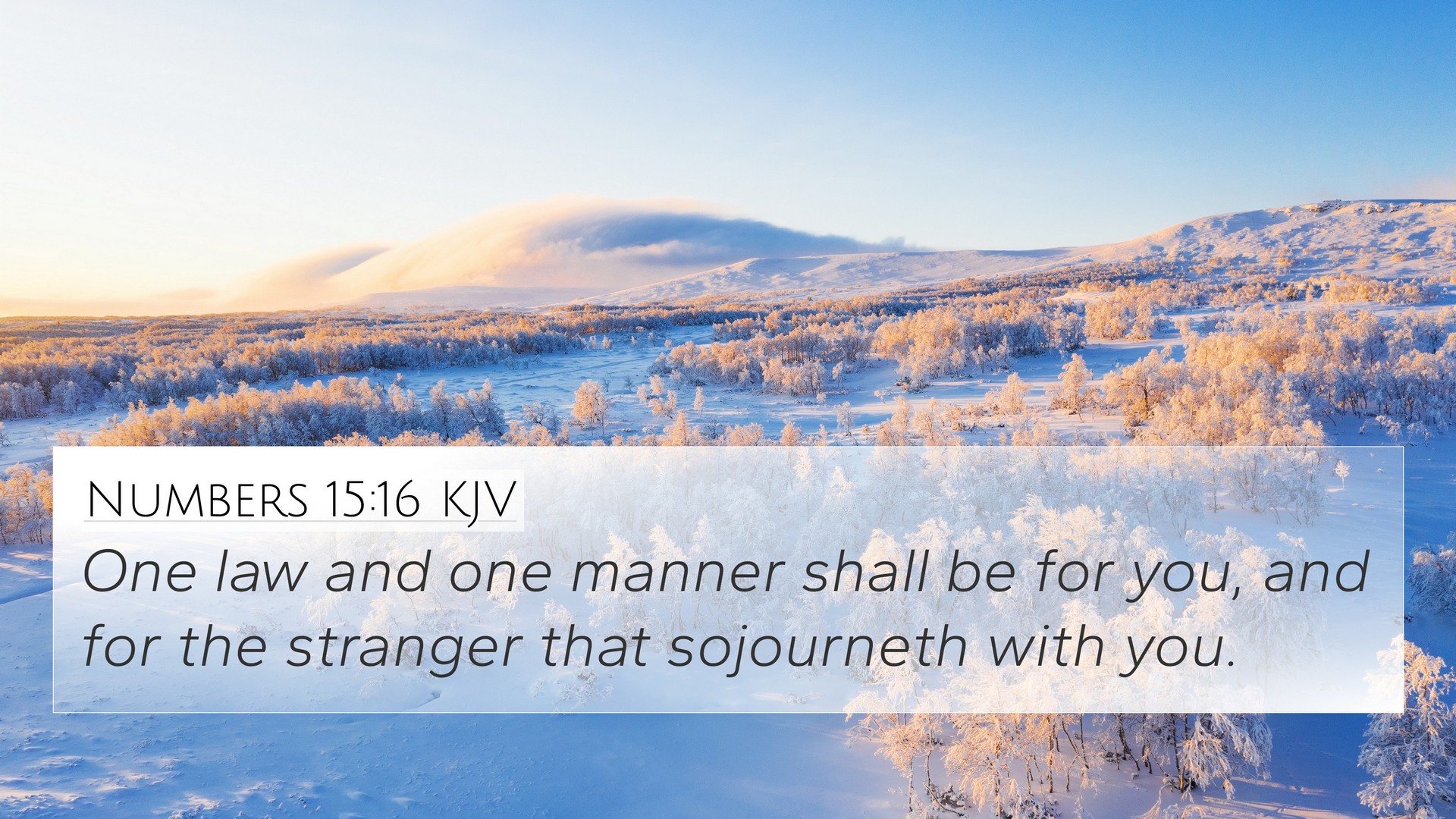Understanding Numbers 15:16
Verse: Numbers 15:16 - "One law and one ordinance shall be for you, and for the stranger that sojourneth with you."
Summarized Meaning
Numbers 15:16 emphasizes the principle of unity in God's law, asserting that the same laws apply to both Israelites and foreigners residing among them. This calls for an inclusive community where God's directives are universal, highlighting God's desire for all people to adhere to His covenant.
Insights from Commentaries
-
Matthew Henry:
Henry notes that this verse shows God's justice and equity. He emphasizes that the law of God is not exclusive but is intended to unify all individuals under God’s rule. This divine ordinance aims to integrate the stranger into the covenant community, providing a sense of belonging and shared responsibility.
-
Albert Barnes:
Barnes highlights the significance of the phrase "one law" as indicating a uniform standard for behavior regardless of one's origin. This reflects the essential equality among God's people and reinforces the notion that adherence to God’s commandments transcends ethnic or social distinctions.
-
Adam Clarke:
Clarke elaborates on the implications of this verse for social justice, pointing out that the law serves as a foundation for the moral and ethical climate of the community. He argues that the oneness of the law promotes harmony and peace among diverse groups, thus strengthening social cohesion.
Bible Cross References
- Exodus 12:49: "One law shall be to him that is homeborn, and unto the stranger that sojourneth among you."
- Leviticus 24:22: "Ye shall have one manner of law, as well for the stranger, as for one of your own country: for I am the LORD your God."
- Deuteronomy 1:16-17: "And I charged your judges at that time, saying, Hear the causes between your brethren, and judge righteously between every man and his brother, and the stranger that is with him."
- Deuteronomy 10:19: "Love ye therefore the stranger: for ye were strangers in the land of Egypt: I am the LORD your God."
- Galatians 3:28: "There is neither Jew nor Greek, neither bond nor free, neither male nor female: for ye are all one in Christ Jesus."
- Ephesians 2:19: "Now therefore ye are no more strangers and foreigners, but fellowcitizens with the saints, and of the household of God."
- Romans 10:12: "For there is no difference between the Jew and the Greek: for the same Lord over all is rich unto all that call upon him."
Thematic Bible Verse Connections
The theme of inclusivity and unity in God's law resonates through various scriptures, establishing a foundation for inter-Biblical dialogue about justice, equality, and communal identity.
Similar Contextual Themes
This verse can be connected to numerous thematic inquiries:
- Justice and Equity: Fundamental tenets in the law that emphasize fair treatment of all individuals.
- Communal Identity: Exploring the relationship between inclusivity in faith and community bonding.
- God’s Covenant: Understanding how divine laws govern not only the Israelites but also reside intertwined with outsiders.
Practical Application
Understanding this verse deepens our appreciation of Biblical laws as tools for fostering inclusivity and community. It encourages believers to reflect on their treatment of others, promoting an atmosphere of love, acceptance, and participation in God's family.
Conclusion
Numbers 15:16 serves as a powerful reminder of God’s inclusive nature and the call for unity among His people. This verse and its cross-references collectively explain the essence of God’s law as a binding communal element, making it essential for believers to study and reflect on these connections.


